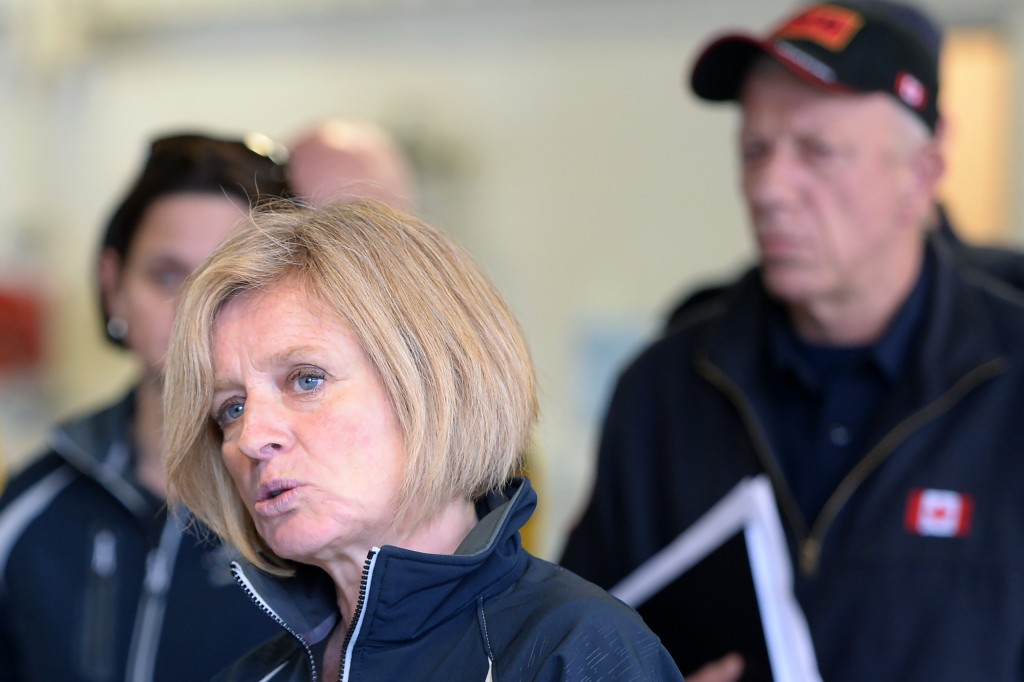
Fort McMurray is still 90-percent intact despite a week of damage from the wildfires devastating Canada’s oil sands region, Alberta’s premier said after touring the deserted city on Monday. Firefighters warned however that the tens of thousands of residents evacuated from the western oil city would not be able to return for at least two weeks. / AFP PHOTO /
by Michel COMTE
FORT MCMURRAY, Canada (AFP) — Fort McMurray is largely intact despite a week of damage from the wildfires devastating Canada’s oil sands region, Alberta’s premier said after touring the ghost town on Monday.
Firefighters warned, however, that the tens of thousands of evacuated residents would not be able to return for at least two weeks.
“It was a miracle we got the entire population out safely,” Alberta Premier Rachel Notley told reporters.
“Equally miraculous… the fast action and the hard work and dedication and the smarts of the first responders has, it appears, saved 90 percent of the city of Fort McMurray.”
Notley commented after getting a first look at damage caused by the inferno more than a week after it began, forcing some 100,000 people to flee. Many are workers lured from around the world by the local oil boom.
But with much work required to restore water, electricity, gas and other key infrastructure, fire chief Darby Allen said authorities would need two weeks before being able to provide a timeline for when the first residents would be allowed back home.
“If that fire had gotten into downtown, we would have lost the downtown area,” he said.
Notley said she was “very much struck by the power of the devastation of the fire.”
“The city was surrounded by an ocean of fire only a few days ago… It was quite overwhelming in some spots,” she said.
“I will also say that I was similarly struck by the proximity of the devastation to neighborhoods that were untouched.”
Some 2,000 homes were destroyed by the blaze that began in the forests west of the city but hundreds others were spared — including the hospital and most of the schools, Notley said. Smoke was still rising from the ruins.
Despite the good news, the fire was still advancing to the east and has ravaged more than 200,000 hectares (494,200 acres) of forest, said Chad Morrison, senior wildfire manager for Alberta.
“We expect cooler temperatures the next two days to continue to help us to have success in the communities and areas,” he added.
In total, 700 firefighters were on hand to battle the blaze, as well as 20 helicopters and 27 air tankers.
With the extra help, crews are now expected to turn their attention to the oil facilities that are the economic lifeblood of western Alberta province.
Damages and losses according to initial estimates total some $9 billion.
Thousands homeless
Frustration mounted among evacuees crammed into shelters after a traumatic flight from the oil city.
At the closest evacuation center to the fires, in Lac La Biche, about 300 kilometers (185 miles) south of Fort McMurray, security was doubled overnight and entry has become more tightly controlled.
“People are tired, they’re frustrated, they feel helpless, and sometimes they just lash out,” said security guard Mustafa Abraham.
Abraham said half a dozen people had been briefly taken into custody by municipal peace officers and security guards, mostly for drunkenness or unruliness.
Minister of Public Safety Ralph Goodale urged evacuees to be patient.
“The recovery here is not going to be quick and it’s not going to be easy. It will be essential to make sure that can be done safely,” he said.
While flames largely spared the downtown area, residential areas, particularly to the west and north of Fort McMurray, have been devastated, said officials. Thousands have been left homeless.
Financial aid
For thousands forced to clear out from the city about a week ago, university dorms, youth hostels and camp grounds — or even parking lots — are now home, in many cases hundreds of kilometers (miles) from Fort McMurray.
Another problem is providing schooling to the children affected by the disaster, which threatens to continue for weeks and maybe months.
On Monday, Alberta’s capital city Edmonton and its largest city Calgary, offered a total 12,000 spots in their schools for children who evacuated Fort McMurray.
Some five tonnes of vital food supplies were airlifted by helicopter to an indigenous community to the southeast of Fort McMurray.
In a bit of good news, evacuees were finally set to receive financial aid: $1,250 for each adult and $500 per dependent to tide families over until they can access their own financial resources.
Insurance companies, meanwhile, have said they will also work to make funds available quickly for claims over losses sustained in the disaster.
mbr/mdl/oh
© 1994-2016 Agence France-Presse








